Meet Our Current Fellows
My favorite part about being a fellow at Johns Hopkins is the sense of collaboration. In my first year, I always felt supported by my attendings, staff, and co-fellows and I never worried alone. I also found a ton of support for my research interest. My mentor was very patient with me as I learned to write my first grant proposal. I feel like everyone here really wants me to succeed.
Cecilia Albers, CAP fellow about first year
Through serendipity, patient safety and quality improvement became a focus of my fellowship experience. In first year, fellows participate in a longitudinal patient safety course led by a faculty mentor. Delving into patient safety issues from our own experience during fellowship brought quality improvement concepts to life. In second year, I chose to continue work on our project through a research lens. Truly, the opportunity to work with a particular faculty mentor drew me to continue the project. Over the past year, I have learned an abundance of research, leadership, and interdisciplinary collaboration skills through working with my mentor. Most importantly, my mentor always provided encouragement and made me feel valued as a colleague—quality improvement at its core.
Maxine Pottenger, CAP fellow about second year
Robert Berg, M.D.
Johns Hopkins Hospital
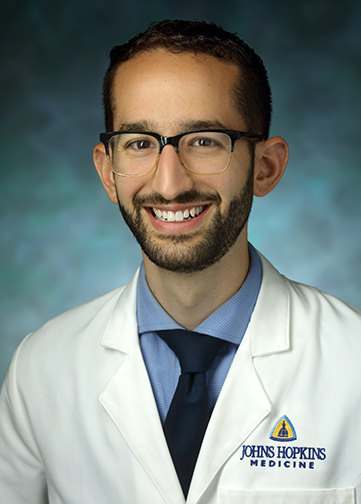
Nina Burruss, M.D.
University of North Carolina
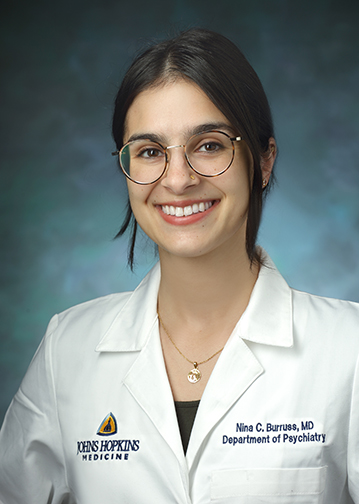
Lawrence Gross, M.D.
University of Miami
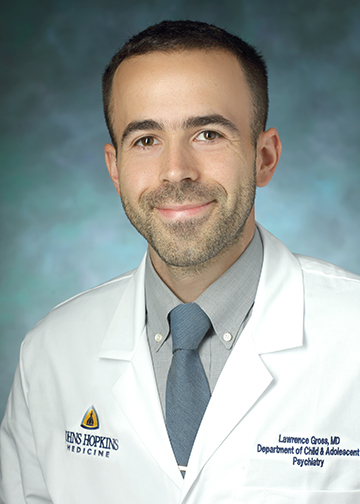
Naziya Hassan, M.D.
BronxCare Hospital
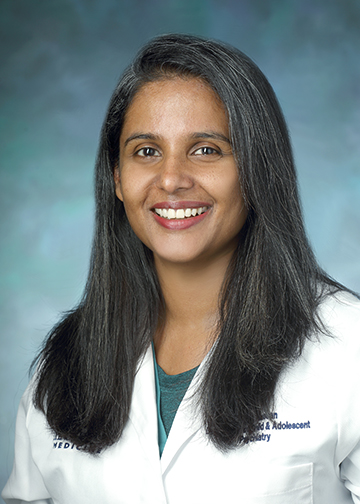
Elizabeth Kim, D.O.
Lehigh Valley Health Network
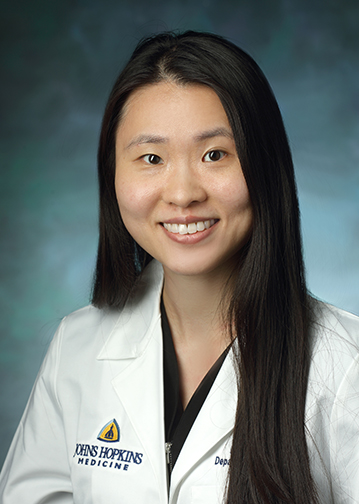
Diane Ukwuoma, M.D.
SUNY Upstate
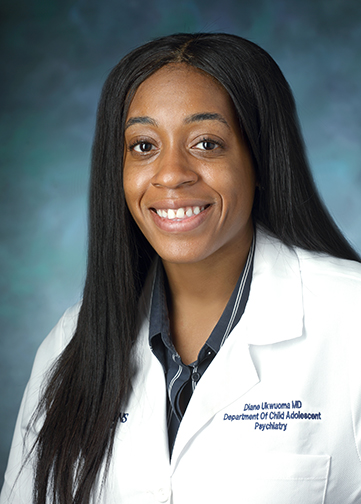
Raghad Alkhafaji, M.D.
Kansas City University of Medicine and Biosciences
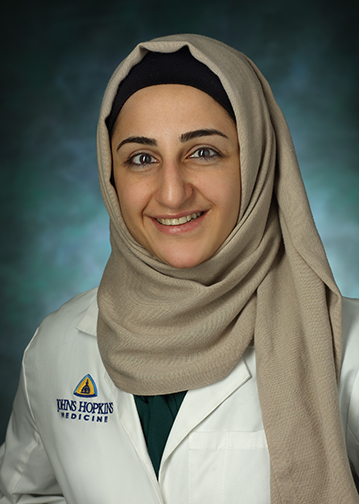
Lauren Burton, M.D.
West Virginia University Ruby Memorial Hospital
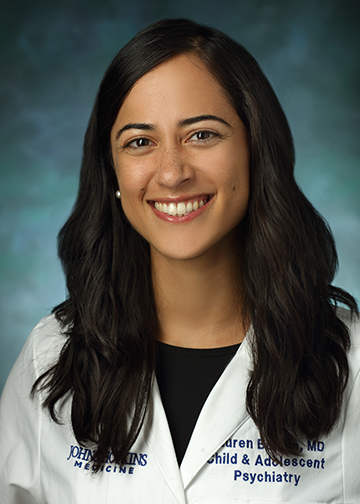
Akash Jaggi, M.D.
University of Central Florida
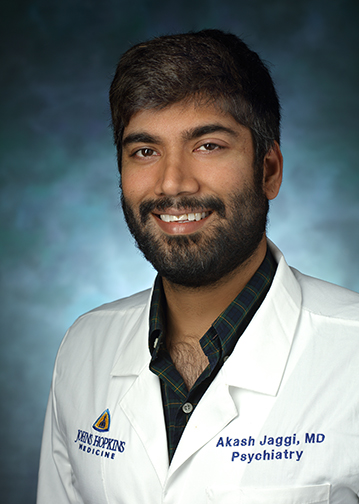
Hala Katato, D.O.
Henry Ford Hospital
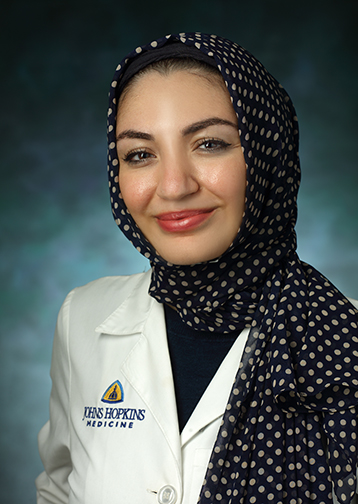
Jonathan Muniz, M.D.
Texas Tech University Health Science Center
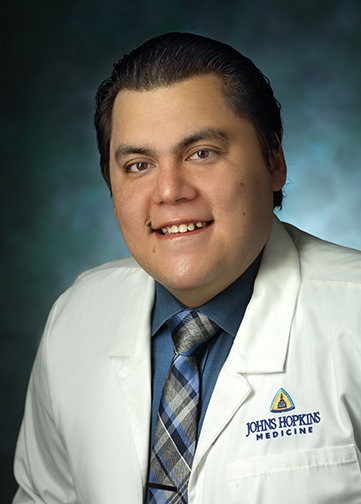
Aditya Sareen, M.D.
Bronx Care Health System – Mt. Sinai
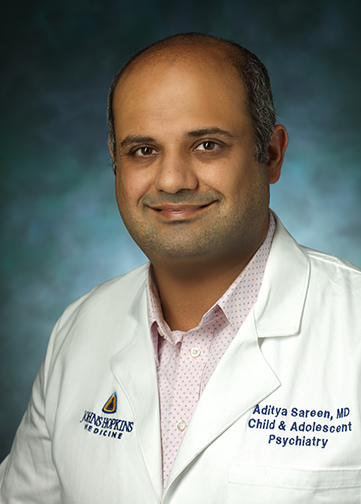
Peer-to-Peer
A Typical Day in Year One
From Bushra Rizwan
Hi there! My name is Bushra and I am glad that you are considering Johns Hopkins for your Child and Adolescent Psychiatry training. I want to share with you my experience as a first year CAP fellow on the inpatient rotation.
A typical day on the inpatient rotation starts at 8:00 AM, and I usually get into the office by 7:45 AM to look at the patient list and review overnight nursing reports in EPIC. I make the short, one-minute walk from my office on Bloomberg 12 North to meet with the attending and psychiatry resident in the "Blurple" (blue-purple) rounds room on Bloomberg 12 South. I briefly check-in with my attending and coordinate assignment of patients with the on-service 2nd year psychiatry resident.
Our Child and Adolescent Inpatient Unit (Bloomberg 12 S) has a census of 15 patients, and each trainee has a case load of about five patients. We start rounding on our patients shortly after 8:00 AM, we see most of our patients in the Blurple rounds room, however there a few acute patients who we see in their individual rooms. All the patient rooms have views of the Harbor and provide a therapeutic milieu for our patients. We are usually done with rounds at around 9:30-9:45 AM.
Due to COVID-19 restrictions, we return to our offices to do interdisciplinary team rounds via Zoom from 9:45-11:00 AM, which includes nursing, psychology, occupational therapy & social work. During the team rounds we discuss new patients, treatment plans which includes medication changes and behavioral interventions, and team observations. After team rounds, I reach out to families with updates on the treatment plan. I also use the time between 11:00-11:45 AM after team rounds to sign-off on all my progress notes. I usually grab lunch quickly before starting didactics at noon.
We have didactics at noon every day from Monday to Thursday, and have process group on Fridays. After didactics, I have family meetings scheduled in the afternoon, which have been a mix of both in-person and zoom meetings. I utilize family therapy techniques during these sessions and will often lead the discussion on treatment goals, safety, and discharge planning. I am usually done with clinical duties by 2:00 PM.
Sometimes, we have admissions scheduled in the afternoon, which will take about 2 hours to complete. If we do not have an admission, I will return to the unit to spend time with the kids and talk about their interests and treatment goals. My inpatient day usually ends around 5:00 PM. The inpatient rotation gives me an opportunity to get to know my patients well, while learning to work with families, and the interdisciplinary team in managing complex patients.
Year Two Developments
From Maxine Pottenger
The second year of fellowship allowed me to explore in depth outpatient community psychiatry, subspecialty clinics, and research. There were several half-day clinics each week that spanned the entire year; these longitudinal experiences deepened my relationships with patients and families, allowing me to hone skills in treating a wide variety of patients. I particularly enjoyed the outpatient community psychiatry clinic where the team model fosters weekly discussion between therapists and psychiatrists and increased independence in direct patient care. Another highlight is the developmental disabilities clinic, where I learned from an attending with subspecialty expertise, as well as from the diverse patient population we served. In addition to clinical experiences, I had plenty of elective time to conduct a patient safety research project with faculty mentorship. These experiences and mentor relationships prepared me well for my first job after fellowship.
Given the ample time for professional development in second year, taking home-call one night every other week felt very manageable. In fact, doing admissions on-call helped me recognize my professional growth over the two years in fellowship, as my interview style and decision making evolved. It always made my day when an attending or first year fellow on the inpatient service sent me an email of appreciation about an on-call admission. Getting to know the inpatient nursing staff over two years was a hidden bonus of call—the team camaraderie made work feel even more worthwhile.
Curriculum
First Year of Fellowship
The first year of training focuses on the principles of diagnosis and treatment of children and adolescents who present primarily in the hospital setting. Fellows learn specific interviewing techniques and adaptations of the principles of psychopharmacology to children and adolescents. They learn about manualized psychotherapeutic techniques (including cognitive behavior therapy, parent management training, and dialectical behavioral therapy) and non-manualized psychotherapeutic techniques (including psychodynamically informed psychotherapy, supportive psychotherapy, and family therapy), as well as the systems of care surrounding children, the interactions between development and pathology, and the obstacles to care.
First Year Rotations
- Inpatient Unit (I) – roughly four months
- Day Hospital Unit (DH) – roughly two months
- Consultation-Liaison Service (CL) – roughly three months
- Outpatient Rotation (E1, E2, ED) – roughly three months. These include child neurology, school-based psychiatry, child mobile treatment, forensics, substance abuse, eating disorders, developmental disabilities.
- Collaborative Continuity Clinic (i.e., outpatient experience) – one half-day per week
- Home-Call Coverage – weekends only, on average one day in every fourteen
First Year Didactics
The clinical experience is enhanced by didactics specifically tailored to the knowledge base of the first-year fellow. A Summer Session provides information about the policies and procedures for documentation, communication, the differences between working with adult patients and with child patients and their families, the initial assessment, engagement strategies when working with youth and families, skills in managing a crisis situation, and the attitude expected towards patients, families, and multidisciplinary teams. In addition, throughout the year there are didactics on critical journal reading, the consultation process, child and adolescent psychopharmacology, ethics, forensics, development, and the social determinants of health. Also, there are lectures on psychotherapy techniques including family therapy, cognitive behavior therapy, parent management training, and dialectical behavioral therapy.
Second Year of Fellowship
The second year focuses on the diagnosis and treatment of children, adolescents, and their families primarily in the outpatient setting. Fellows develop a deeper understanding of therapeutic interventions in outpatient clinics and have the opportunity to pursue a variety of electives. In addition, there are also opportunities to develop research and writing skills and participate in ongoing research with faculty guidance.
Second Year Rotations
- Collaborative Continuity Clinic (CCC) – one half-day per week and a treatment continuation opportunity with patients from the first year
- Scholarly Activity/Administrative Day – 1 day per week
- Therapy experience – equivalent to one half-day per week, with six months of the year focusing on CBT and six months focusing on family therapy
- Children’s Mental Health Clinic (CMHC) – one day per week
- Elective/Psychotherapy clinic – one day per week
- Kennedy Krieger Institute (KKI) Center for Autism and Related Disorders (CARD) or KKI’s Psychiatric Mental Health Program with emphasis on developmental disabilities (DD) – one half-day per week
- Home-call coverage – on average once every fourteen evenings throughout the year
Second Year Didactics
The second year didactics focus on advanced topics of child and adolescent psychiatry and build on the material learned in the first year of fellowship. Expert faculty members are invited to speak on topics including developmental disabilities, neuropsychology, neuroscience, genetics, evidence-based practice, and psychiatric formulation.
Divisional Conference Topics
In addition to the first and second year didactics, additional teaching occurs at the Divisional Conference held on Wednesdays. This weekly conference is a combination of faculty presentations, case discussions, and lectures by invited faculty from the divisions of Pediatrics, Neurology, and the School of Public Health, as well as current second-year child and adolescent psychiatry fellows. The conference covers a variety of “hot topics”, challenging issues, and complex clinical situations.
